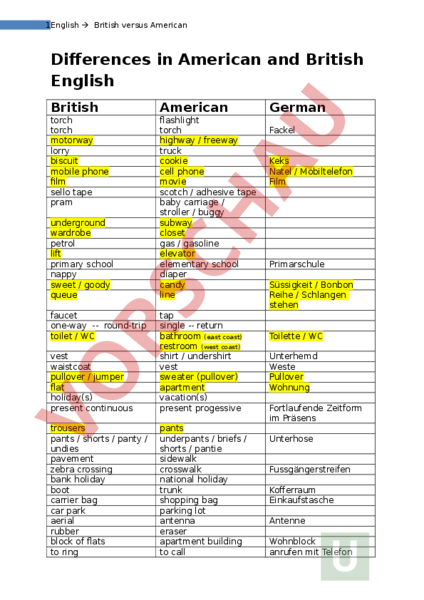Arbeitsblatt: American vs British English
Material-Details
American vs British English
Englisch
Wortschatz
8. Schuljahr
2 Seiten
Statistik
164260
806
10
03.09.2016
Autor/in
j-lee (Spitzname)
Land: Schweiz
Registriert vor 2006
Textauszüge aus dem Inhalt:
1English British versus American Differences in American and British English British American torch torch motorway lorry biscuit mobile phone film sello tape pram flashlight torch highway freeway truck cookie cell phone movie scotch adhesive tape baby carriage stroller buggy subway closet gas gasoline elevator elementary school diaper candy line underground wardrobe petrol lift primary school nappy sweet goody queue faucet one-way -- round-trip toilet WC vest waistcoat pullover jumper flat holiday(s) present continuous tap single -- return bathroom (east coast) restroom (west coast) shirt undershirt vest sweater (pullover) apartment vacation(s) present progessive trousers pants shorts panty undies pavement zebra crossing bank holiday boot carrier bag car park aerial rubber block of flats to ring pants underpants briefs shorts pantie sidewalk crosswalk national holiday trunk shopping bag parking lot antenna eraser apartment building to call German Fackel Keks Natel Mobiltelefon Film Primarschule Süssigkeit Bonbon Reihe Schlangen stehen Toilette WC Unterhemd Weste Pullover Wohnung Fortlaufende Zeitform im Präsens Unterhose Fussgängerstreifen Kofferraum Einkaufstasche Antenne Wohnblock anrufen mit Telefon 2English British versus American rubbish tights bank note bill garbage pantyhose bill check Banknote Rechnung (Bezahlung, Restaurant) (trash) bin caravan bonnet barmaid, barman barrister, solicitor mean nasty trash can trailer hood bartender, barkeeper attorney tight fisted, stingy mean Abfalleimer Mütze Barkeeper Rechtsanwalt geizig gemein, fies, mies Spelling – Orthography centre theatre realise organise industrialise criticise cancelled travelled labour neighbour colour humour flavour practise center theater realize organize industrialize criticize canceled traveled labor neighbor color humor flavor practice Arbeit Arbeiter Arbeits- üben praktizieren Possession There are two forms to express possession in English. Have or Have got Do you have car? Have you got car? He hasnt got any friends. He doesnt have any friends. She has beautiful new home. She got beautiful new home. While both forms are correct (and accepted in both British and American English), have got (have you got, he hasnt got, etc.) is generally the preferred form in British English while most speakers of American English employ the have (do you have, he doesnt have etc. 3English British versus American Past Simple/Past Participles The following verbs have two acceptable forms of the past simple/past participle in both American and British English, however, the irregular form is generally more common in British English (the first form of the two) and the regular form is more common to American English. burn burnt OR burned dream dreamt OR dreamed lean leant OR leaned learn learnt OR learned smell smelt OR smelled spell spelt OR spelled spill spilt OR spilled spoil spoilt OR spoiled Grammar, tenses: In British English the present perfect is used to express an action that has occurred in the recent past that has an effect on the present moment. For example: Ive lost my key. Can you help me look for it? In American English the following is also possible: lost my key. Can you help me look for it? American English: just had lunch OR Ive just had lunch Ive already seen that film OR already saw that film. Have your finished your homework yet? OR Did you finish your homework yet? In British English the above would be considered incorrect. However, both forms are generally accepted in standard American English. Other differences involving the use of the present perfect in British English and simple past in American English include already, just and yet. British English: Ive just had lunch Ive already seen that film Have you finished your homework yet? Anmerkung U. Bernegger: Timemarker gives you clue of which time to use! As our course book tends to be based on Standard British English, we all go for this version!
